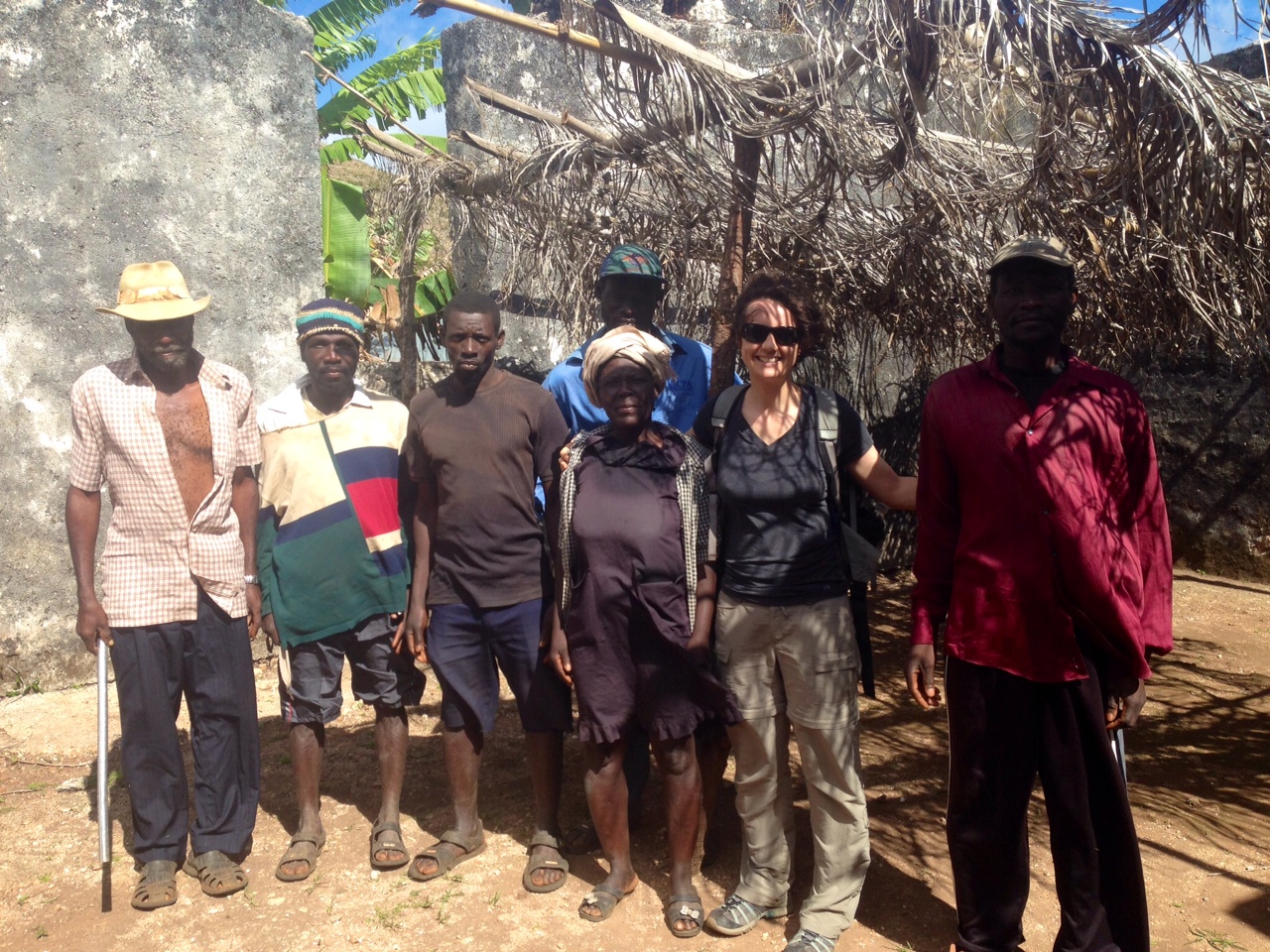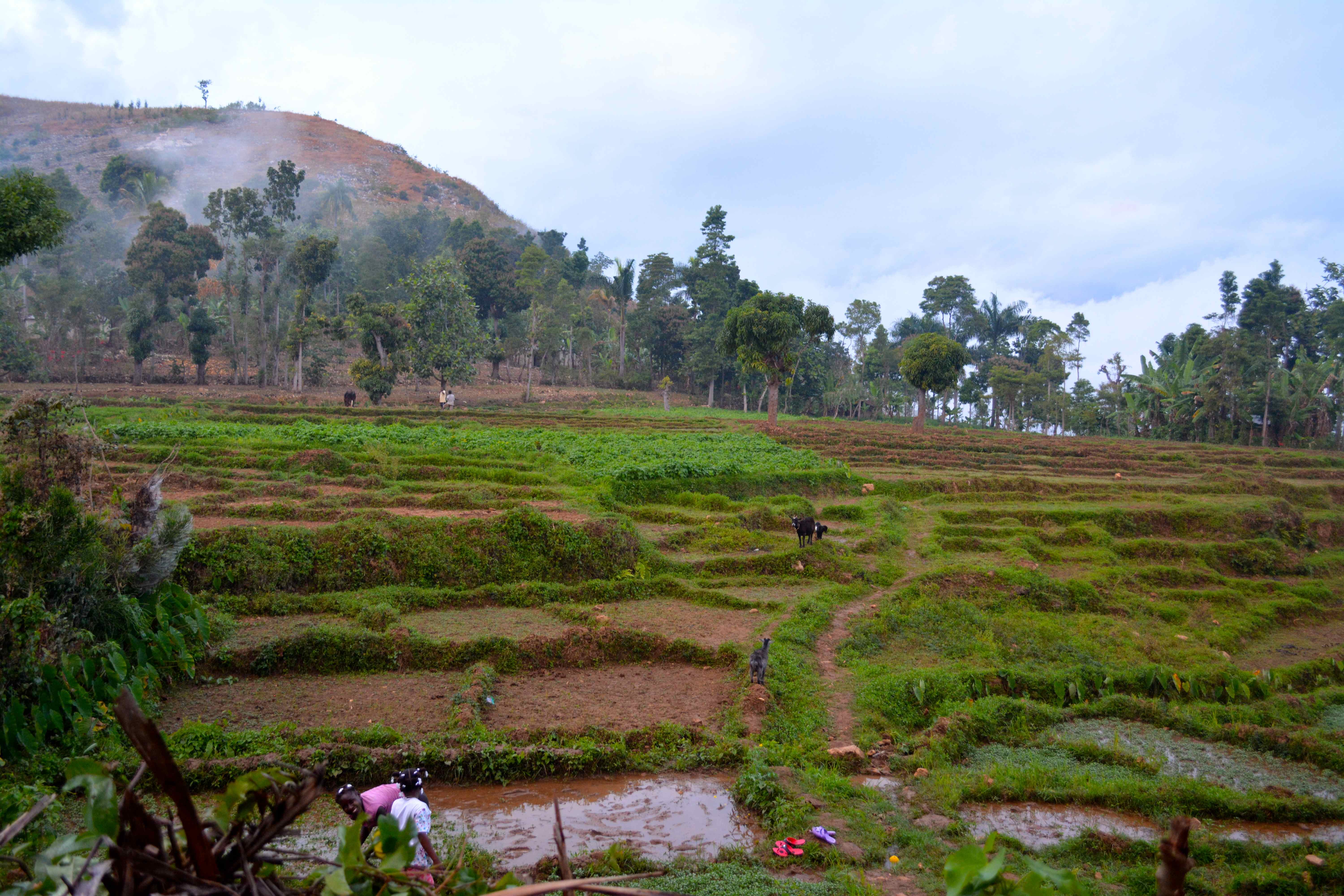By Cindy Corell, Companionship Facilitator, FONDAMA, JH Haiti

The Rev. Kimberly Well, associate pastor of First Presbyterian Church, Charlottesville, VA., poses with members of MRPST in La Croix, a remote mountaintop village accessible only by hiking two hours up the steep mountain. Photo courtesy of Rev. Kimberly Well.
One thing farmers in rural Haiti understand is that if you take their land, you take their lives.
I can tell you that, and you might understand.
But when a delegation from the Presbytery of the James visited for a week in February 2015, I needed to help them understand in a deeper way. So, we visited Dofine, high in the mountains above the Artibonite Valley.
When we arrived there, after a perilous journey past many roadblocks due to a countrywide transportation strike over the high price of fuel, and up a treacherous mountain road, members of our host farmer organization greeted us with hugs and warm welcomes.
The delegation of seven from Virginia would not understand until much later that one of the men greeting us so warmly once had been falsely imprisoned and tortured because this organization fought back against illegal land grabbing.
Merandieu Cèus, his brothers and nine other young men chartered the Peasants Movement of Landless Farmers Reclaiming their Rights (MRPST) in 1998, in response to the theft of small farmers’ land for generations by a wealthy neighbor and large scale landowner.
Organizing and protesting the land grabbing cost the lives of three men from Dofine.
Merandieu Cèus and several others were falsely imprisoned.
“Nou senyen pout tè a,” Andre Cèus, brother of Merandieu, told the group. “Nou jwenn viktwa nan tè a.” “We bleed for the land. We find victory in the land.”
After denouncing the land thefts by the wealthy neighbor and feeling the brunt of the neighbor’s powerful and violent response, MRPST members went into hiding. In 2005, they came out of hiding and marched together — they numbered 3,000 — to the courthouse in St. Marc. “If you want to arrest us, then arrest us all,” they said.
After that, most of the violence stopped, and an early attempt at agrarian reform led to their land being returned.
Since its slaves beat back the French army and won their own freedom and later the independence of Haiti, this small, mountainous nation has lived from the land. Until the 1970s, Haitian farmers provided the food necessary to feed the Haitian people.
But political corruption and unfair trade policies changed that. Today, imported food is so much cheaper; it undercuts the profits of the small stakeholder farmer.
In Haiti, even farmers go hungry.
Today, thousands of grassroots farmer organizations are working together to help their communities. Like in those early days of freedom, small stakeholder farmers are the backbone of the economy. They live hand-to-mouth, just one hurricane or drought away from losing everything.

Two young girls harvesting watercress from the fields behind the school at Dofine. Peasant farmers grow rice in these fields, and between seasons, they grow watercress there. Photo courtesy of Cindy Corell
Hundreds of these organizations are represented by a network of farmer organizations called Fondasyon Men and Men Ayiti (FONDAMA), or the Hand to Hand Foundation of Haiti. FONDAMA is one of 9 Joining Hands networks, an initiative of the Presbyterian Hunger Program.
Each network is designed to identify a root cause of poverty and create an advocacy campaign around that issue. In Haiti, the issue is agrarian reform — strengthening the Haitian law protecting the farmland and decrying threats to peasant farmers’ land.
One such threat is land grabbing, which happens in many forms. It can be a wealthy landowner stealing bits of adjacent property over time, as in Dofine. Or it can be a large scale corporation tossing peasant farmers from their land to create plantations growing food for export.
It can be a large hotel corporation removing people from their homesteads on a beautiful island to make room for an international and extremely profitable resort.
As the Haitian government itself is touting the beautiful but poor Caribbean country as “open for business”, the rural farmer is at an even greater risk of losing land and, with it, their families’ lives.
The Presbytery of the James in Virginia has staunchly supported the work of FONDAMA. Its February visit was the third such visit in four years. They will join FONDAMA in advocating against any and all land grabbing in Haiti as the young network builds its platform and campaign for agrarian reform.
The delegation returned to Virginia to tell of it.
MRPST operates two small schools, seed banks and training on farming and marketing. They actively support the yard gardens program, in which families create compost and grow crops in uses automobile tires.
But the story of how MRPST began is what resonates.
“The price of soil does have a cost that is associated with it, and fully understanding that cost is extremely important,” said Bill Nix of First Presbyterian, Fredericksburg, Va. “It is up to us to find the true price of the soil. Without knowing that, how can we advocate correctly?”
“This story is a stark reminder of what role FONDAMA plays in this good work, what role they play in making a difference,” said the Rev. Elizabeth McGuire, associate pastor of Salisbury Presbyterian Church, Midlothian, Va. “I had no idea that stories like these still exist in Haiti. It is a huge confirmation of the long-standing and deep-rooted passion and strength of the Haitians, and how it is ultimately tied to the land.”
Our delegates have returned home to begin the advocacy by helping congregations understand the human cost of illegal land grabbing. FONDAMA will continue the fight in all corners of Haiti, and asks for your listening heart and prayers.
“Tè a bay nou lavi,” said Lormè Previlus, coordinator of a grassroots farmer organization. “The land gives us life.”
![]() You may freely reuse and distribute this article in its entirety for non-commercial purposes in any medium. Please include author attribution, photography credits, and a link to the original article. This work is licensed under a Creative Commons Attribution-NonCommercial-NoDeratives 4.0 International License.
You may freely reuse and distribute this article in its entirety for non-commercial purposes in any medium. Please include author attribution, photography credits, and a link to the original article. This work is licensed under a Creative Commons Attribution-NonCommercial-NoDeratives 4.0 International License.